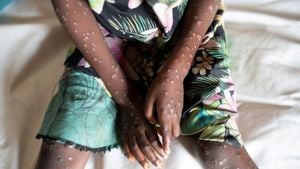On November 19, 2024, the fate of 45 pro-democracy activists will be decided as they face sentencing under Hong Kong’s controversial National Security Law. This significant trial, recognized as one of the most consequential moments for democracy advocates since the imposition of the law, has captured the world’s attention, highlighting the continued suppression of dissent within the semi-autonomous region.
The activists being sentenced were part of the group known as the 47, who organized what the Hong Kong government deems as “unofficial” primary elections. These elections were held back in July 2020 to select candidates for the Legislative Council elections and aimed to bolster the pro-democracy presence within the local government. Over 600,000 voters turned out, showcasing the desire of many Hong Kong residents to have their voices represented amid Beijing's increasing control.
Among those awaiting their sentencing are some of the most prominent figures within the pro-democracy movement. Joshua Wong, who was only 17 when he emerged as one of the leaders during the Umbrella Movement of 2014, has been continually active since then, advocating for political rights and liberties. Wong has faced multiple charges and was found guilty of organizing and inciting citizens to participate in unauthorized assemblies. Following the imposition of the National Security Law, he has been sanctioned heavily, and his political pursuit has led to his current impending sentencing.
Another key figure is Benny Tai, who has been influential within the political community as well. Known for his role in founding the Occupy Central Movement, he had long fought for civic rights and education before being swept up by these trials. Tai's controversial views, partly encapsulated by his remark on legislative majority being a "weapon of mass destruction," have been central to the case against him.
Claudia Mo, known affectionately as Auntie Mo, also finds herself among the defendants. The former journalist has long warned against the encroaching authoritarianism from Beijing, painstakingly articulately the dangers of losing civil liberties. Her prior experiences lend weight to her position, yet they couldn't shield her from the current legal battle, culminating in her trial under the National Security Law.
Gwyneth Ho, another remarkable voice for democracy, faces similar charges. Having reported on the protests and expressive events, she has unyieldingly supported Hong Kong's right to free speech and assembly. Despite the heavy charges against her, she continues to use her voice as both journalist and activist, setting the tone for future generations who might uphold and fight for democratic values.
These trials have been characterized as politically motivated attempts to silence dissent and shatter the remaining hopes for democracy within Hong Kong. Many international observers have drawn parallels to the legacy of colonial suppression of thought and freedoms. The current international climate has seen numerous calls for governmental accountability and intervention, as world leaders reflect on how to respond meaningfully to these injustices.
The situation surrounding the 47 creates significant questions about the International Law framework. Activists and legal experts argue fervently, insisting these measures are unjust, as they hypocritically deteriorate the very human rights frameworks many nations endorse. A report by the United Nations Working Group on Arbitrary Detention highlighted this issue, with findings underscoring unauthorized detentions of these activists, urging immediate resolutions and evaluations of human rights standards within the region.
One of the pivotal aspects of the approaching sentencing is the resonance it holds across western nations. The shift from political dialogue to punitive legislation raises alarms among human rights organizations and policymakers across the globe. A renewed Deferred Enforced Departure (DED) for Hong Kong activists may emerge as one potential tool for immediate relief, providing individuals fleeing oppressive regimes temporary safe harbor.
The upcoming verdicts will inevitably ripple through the fabric of political alliances as well. Many governments will be left to grapple with their respective approaches to China’s increasingly aggressive political stance and its repercussions on international diplomacy. Critics urge the need for clear policies bolstering humanitarian avenues and interventions rather than dismissive agreements on mutual benefits, urging leaders to embrace tangible human rights advocacy.
On the trial's own merits, the arguments rest on the interpretation of National Security laws vis-à-vis civic rights—Are these prosecutions merely lawful enforcement of necessary order, or do they symbolize the systematic dismantling of political pluralism? These momentous indictments will not only determine the immediate standing of numerous activists but symbolize the broader closing of dissenting avenues within Hong Kong.
This ever-compounding legislative crackdown means uncertainty looms large. The outcome of future civic engagement and activism might be stifled for years until authentic engagement and representation are reinstated. The world watches as Hong Kong's pro-democracy movement reflects on its legacy, initiating conversations on what democracy means amid suppression and resilience.
While the immediate narrative may center on the lives and threatened freedom of these 45 activists, one cannot help but ponder what these trials signify about civic engagement on the global stage. How can principled dissent survive when legal frameworks seem crafted as nets to suppress? These are questions arising from this trial for all who observe and analyze the status of human rights worldwide.
Even with adverse conditions, these activists’ commitment to their cause continues to shine, embodying unprecedented resilience. The conclusion of their trial and its repercussions might serve as the igniting force for future political engagement — creating dialogue, fostering solidarity, and inspiring worldwide movements for democracy.



